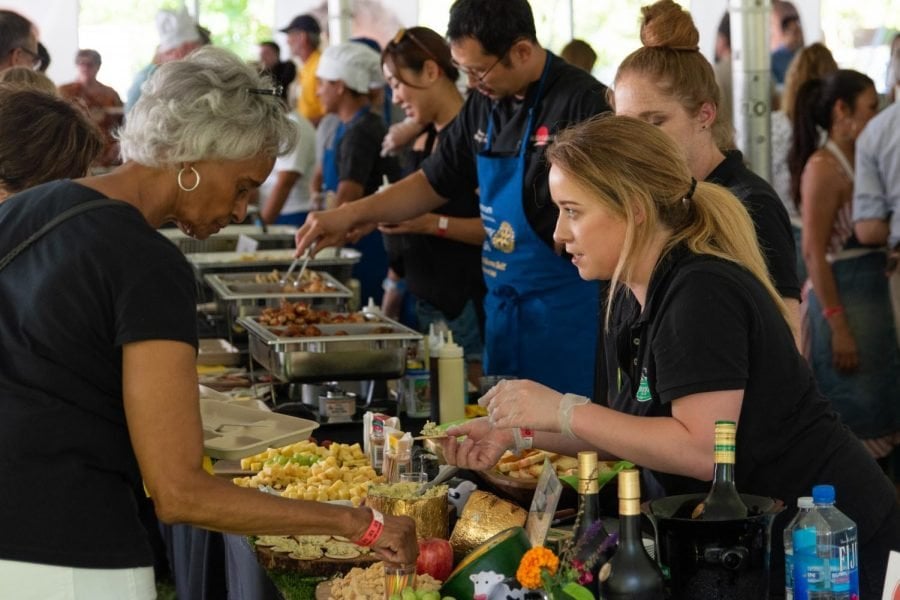Evanston food pantries and soup kitchens prepare for winter
Daily file photo by Brian Meng
Community members get samples from various local food vendors at the fourth annual Taste of Evanston. Evanston’s food pantries and their partner businesses will continue to serve meals to food-insecure residents this winter.
January 22, 2021
Navigating post-holiday lulls and cold weather complications, Evanston’s food pantries and their partner businesses will continue to serve meals to food-insecure residents this winter.
Leslie Shulruff, chair of the Beth Emet Soup Kitchen, said most Evanston food pantries have been ordering their meals from restaurants instead of preparing the food themselves, given the challenges of practicing social distancing within a kitchen.
Beth Emet is currently working with eateries, including La Principal and Dengeos, at discounted rates of $5-$6 a plate. The kitchen also enlists volunteers to prepare salads and desserts at home, which has bolstered volunteer engagement while Beth Emet’s operational capacity remains limited.
Beth Emet currently serves around 60 meals a week, a decreased amount from when indoor seating was open. Shulruff noted that Beth Emet’s current grab-and-go operation — resemblant to ordering takeout — draws in more families due to its casual nature.
“They come for the humanity, as part of it,” Shulruff said.
Connections for the Homeless, which provides financial assistance to those experiencing homelessness in Cook County, has also established numerous restaurant partnerships.
In 2020, the organization raised $545,000, which was used to distribute over 127,800 meals. Jennifer Kouba, Connections’ associate director of development, said partnering with restaurants has been an expensive undertaking.
“The community has really stepped up to support the initiative because of the mutual beneficiality of the partnership; fueling the economy, and also feeding neighbors,” Kouba said.
The Cook County government is the organization’s most substantial economic partner, most recently providing $80,000 in funding for home meal deliveries.
Kouba said Connections does not expect any of the organization’s food pantries to undergo significant adaptations to the cold weather since the organization does not currently coordinate meal service outdoors, although they did reopen their Chicago Avenue pantry this fall. Since October, Kouba said Connections has been primarily focused on feeding those individuals sheltered in Evanston hotels.
For Evanston Vineyard Food Pantry, accommodating to cold weather and snow means transitioning away from the five-lane drive-thru food pickup adopted in March. There are now six designated parking spots in the front lot of Vineyard Christian Church, and volunteers run shopping carts out to each car..
Vineyard is currently serving about 220 Cook County residents a week, down from 275 in the summer and fall. Lisa Haskin, manager of Vineyard, said the winter’s harsh conditions often reduce the number of people who come for food. The organization has also seen fewer volunteers since Evanston schools resumed class this fall.
“With some folks hopefully getting their stimulus checks and extra money in their unemployment, they may now be able to hold off on coming to us,” Haskin said.
As a member agency of the Greater Chicago Food Depository, Vineyard maintains a working relationship with the Evanston city government, though its primary partnership is with Cook County at large. Haskin says Vineyard mostly serves the elderly, as well as those who are between jobs.
According to a recent study by the Center on Budget and Policy Priorities, 6.9 percent of Illinois adults experienced unemployment between September and December 2020, and 13 percent experienced food insecurity between November and December 2020.
The City of Evanston has been directing residents towards these and other resources. In December, the City also began offering four pop-up pantry locations every other Saturday, for which residents can call ahead to the Evanston Public Library. Additionally, Evanston’s emergency Wednesday food pantries are still running, with the next pickup scheduled for Jan. 27 in James Park.
Haskin explains that while the holiday season’s uptick in food drives allows many people to stockpile nonperishables for January, she hopes residents remember that need persists year-round and pantries like Vineyard are still adapting to the COVID-19 pandemic and cold-weather challenges.
“When you’re well-established — and I know there’s other food pantries that are, in Evanston— we all work together,” Haskin said. “We want to make sure our neighbors are fed.”
Email: [email protected]
Twitter: @ilanaarou
Related Stories:
— Evanston food assistance programs adapt to pandemic precautions amidst growing food insecurity
— As food insecurity rates balloon, city officials open emergency pantry at James Park












